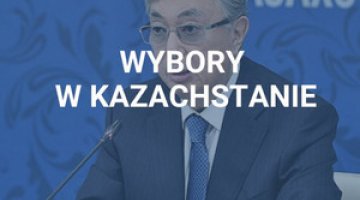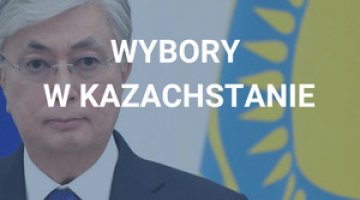Kazakhstan on the edge
In Kazakhstan, for months there has been a growing sense of impending socio-economic crisis. The authorities’ concerns are the result of objective difficulties, which are mainly economic in nature; the rise in internal tensions; and the authorities’ oversensitive approach to the question of domestic stability. In fact, it is the scale of the government’s concern about the possible social responses, rather than the deteriorating socio-economic situation itself, which demonstrates the seriousness and scale of the problems it faces.
At the same time the country’s strategic challenges are increasing, namely its reduced room for manoeuvre in domestic and foreign policy; this is due on the one hand to the increasing role of the Russian factor in Kazakhstan’s politics, and the need to maintain internal stability on the other. The government’s ad hoc response to the rising difficulties is to hold early presidential elections, a suggestion which was made on 14 February. This will not solve the problems Kazakhstan faces, but it will buy some time in the deteriorating economic and political conditions.
The vicious circle of problems
The most tangible problem facing Astana at the moment is the deteriorating economic situation, which is a result of the low oil price (sales of oil generate about two-thirds of Kazakhstan’s export revenues), together with unresolved problems in the banking sector after the crisis of 2008-2009 (the share of non-performing loans in the banking system was 23.5% at the end of 2014) and the loss of competitiveness in the economy’s non-energy sectors. Despite the difficult conditions and the negative perception of Kazakhstan on the markets (as reflected in S&P’s downgrade of Kazakhstan on 9 February), the situation is not yet critical (GDP growth last year was 4.3% year-on-year). The country’s accumulated foreign exchange reserves (the reserves of the Central Bank and the Oil Fund exceed $100 billion) allow the government to maintain social services at their current levels, and to stimulate the economy (by carrying out transport infrastructure projects, et al.).
However, the negative trends are being reinforced by the authorities’ inability to carry out another devaluation of the tenge (the last such move of 19% was carried out last February), for fear of the public reaction, and in contrast to the expectations of the market. The failure to devalue the tenge leads to Russian products flooding the domestic market (the rouble has lost about 45% against the Kazakh currency over the past 12 months), which mainly affects food producers in Kazakhstan, as well as the refinery and automotive sectors. Thus, Kazakhstan is bearing the costs of economic collapse in Russia (although exports to Kazakhstan are of little importance to the Russian economy). The scale of the government’s concerns is demonstrated by its attempts to impose guidelines on the media to report the economic situation in a positive manner.
The government’s main challenge is to maintain the stability and cohesion of the state. One indication of this is the very strong emphasis in recent months on national consensus, the unity of the state and the traditions of Kazakhstan, as well as the role of President Nursultan Nazarbayev as the guarantor of stability. In this context, local ethnic riots (between Kazakhs and Uzbeks last August, and Kazakhs and Tajiks this February) have taken on particular significance, and have led to inadequate responses by the authorities, such as a total information blockade in the regions covered by the riots, and denials that the clashes had any kind of ethnic character. These reactions boil down to a nervous suppression of the problems and a falsification of reality. This is due to the fear that ethnic tensions could break out in northern Kazakhstan, which is inhabited by an ethnic Russian population (23% of the country’s population).
An unresolved succession and Russian pressure
These difficulties are compounded by the systemic problem of basing the state’s stability on the person of President Nursultan Nazarbayev. The authorities are not strong enough to prepare for the succession to Nazarbayev; ideas of balancing out the system in favour of parliament at the expense of the president have been abandoned. The result is that Nazarbayev has re-emerged as the sole guarantor of Kazakhstan’s political system, maintaining the current arrangement. One ad hoc plan for resolving the problem is the proposal put forward on 14 February by the presidentially-controlled Assembly of the People of Kazakhstan to hold early, uncontested presidential elections. The idea is to divert public attention from the country’s economic difficulties, silence speculation about the devaluation of the national currency for a while, and consolidate society around the person of the strong leader by giving him a mandate to continue his current policy. In the official proposal, the need to hold early elections is justified by the need to renew the President’s mandate before the expected economic downturn.
Kazakhstan’s room for political manoeuvre is also narrowing in the face of a changing geopolitical situation: pressure from Russia, and the West’s defensive attitude towards the conflict in Ukraine. Fear of Russia’s policy on post-Soviet space (as demonstrated against Ukraine) has forced Kazakhstan to adjust its existing multi-vector policy to one which is much more pro-Russian. This is reflected in the support granted by Kazakhstan, albeit through gritted teeth, for Russia’s policy towards Ukraine. Concerns about Russian efforts to destabilise the country – for example, by exploiting the Russian minority which constitutes 23% of Kazakhstan’s population – have led to an obsession with the state’s stability and the cohesion of society. This has led to firmer ties with Russia and the incapacitation of Kazakhstan both politically and economically (which also derives from its participation in the Eurasian Economic Union). An example of this is the failure of Kazakhstan’s attempts to reduce the imports of certain goods from Russia, and President Nursultan Nazarbayev’s appeal to Russia to limit its own exports to Kazakhstan is an expression of the government’s helplessness.
As good as it gets: between a rock and a hard place
So far the authorities have indicated that they intend to wait out the mounting difficulties. In the short term, we should expect the current negative trends to grow: the deterioration of the economic situation; increases in domestic tensions; and the reduction of Kazakhstan’s independence in foreign policy. The authorities’ touchiness on the question of internal stability will lead to the strengthening of these trends, which contrary to the government’s intentions will contribute to the increased risk of destabilisation in Kazakhstan, from which Moscow will ultimately benefit. The attempts to correct monetary policy (i.e. the expected devaluation of the currency) will be subject to the same risks. This means, both for objective reasons and because of the authorities’ own fears, that Kazakhstan’s room for manoeuvre is becoming ever narrower, and the risk of destabilisation is rising.




